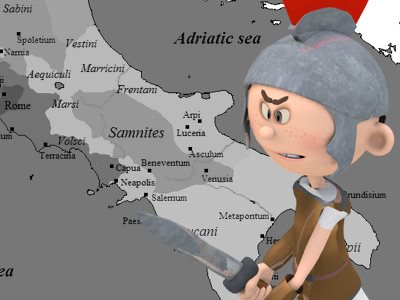Second Samnite War (326-304 BC)

307-304 BC - Final Campaigns in Apulia and Samnium
In 307 BC the consul Lucius Volumnius Flamma Violens was assigned a campaign against the Salentini of southern Apulia, where he seized several hostile towns. Quintus Fabius was elected as proconsul to conduct the campaign in Samnium. He defeated the Samnites in a pitched battle near Allifae and besieged their camp. The Samnites surrendered, passed under the yoke and their allies were sold into slavery. There were some Hernici among the troops and they were sent to Rome where an inquiry was held to determine whether they were conscripts or volunteers. All of the Hernici, except the peoples of the cities of Aletrium, Ferentium and Verulae, declared war on Rome. Quintus Fabius left Samnium, and the Samnites seized Calatia and Sora with their Roman garrisons.
In 306 BC the consul Publius Cornelius Arvina headed for Samnium and his colleague Quintus Marcius Tremulus took on the Hernici. The enemies took all the strategic points between the camps and isolated the two consuls. In Rome two armies were enlisted. However, the Hernici did not engage the Romans The Roman Republic was a form of government of Rome and the era of the classical Roman civilization when it was run through public representation of the Roman people. Beginning with the overthrow of the Roman Kingdom (traditionally dated to 509 BC) and ending in 27 BC with the establishment of the Roman Empire, Rome's control rapidly expanded during this period - from the city's immediate surroundings to hegemony over the entire Mediterranean world., lost three camps, sued for a thirty-year truce and then surrendered unconditionally. Meanwhile, the Samnites were harassing Publius Cornelius and blocking his supply routes. Quintus Marcius came to his aid and was attacked. He advanced through the enemy lines and took their camp, which was empty, and burned it. On seeing the fire Publius Cornelius joined in and blocked the escape of the Samnites, who were slaughtered when the two consuls joined their forces. Some Samnite relief troops also attacked, but they were routed and pursued and begged for peace. In 305 BC the Samnites made forays in Campania.
The Roman Republic was a form of government of Rome and the era of the classical Roman civilization when it was run through public representation of the Roman people. Beginning with the overthrow of the Roman Kingdom (traditionally dated to 509 BC) and ending in 27 BC with the establishment of the Roman Empire, Rome's control rapidly expanded during this period - from the city's immediate surroundings to hegemony over the entire Mediterranean world., lost three camps, sued for a thirty-year truce and then surrendered unconditionally. Meanwhile, the Samnites were harassing Publius Cornelius and blocking his supply routes. Quintus Marcius came to his aid and was attacked. He advanced through the enemy lines and took their camp, which was empty, and burned it. On seeing the fire Publius Cornelius joined in and blocked the escape of the Samnites, who were slaughtered when the two consuls joined their forces. Some Samnite relief troops also attacked, but they were routed and pursued and begged for peace. In 305 BC the Samnites made forays in Campania.
In 305 BC the consuls were sent to Samnium. Lucius Postumius Megellus marched on Tifernum and Titus Minucius Augurinus on Bovianum. There was a battle at Tifernum where some of Livy's sources say that Postumius was defeated, while others say that the battle was even and he withdrew to the mountains at night. The Samnites followed him and encamped near him. Livy said that he seemed to have wanted to gain a position where he could get abundant supplies. Postumius then left a garrison at this camp and marched to his colleague who was also encamped facing the enemy. He instigated Titus Minucius to give battle, which dragged on until the late afternoon. Then Postumius joined in and the Samnites were slaughtered. The next day the consuls begun the siege of Bovianum, which fell quickly. In 304 BC the Samnites sent envoys to Rome to negotiate a peace. The suspicious Romans sent the consul Publius Sempronius Sophus to Samnium with an army to investigate the true intentions of the Samnites. He travelled all over Samnium and everywhere he found peaceable people who gave him supplies. Livy said that the ancient treaty with the Samnites was restored. He did not specify what the terms were.
HISTORY

RESOURCES
This article uses material from the Wikipedia article "Samnite Wars", which is released under the Creative Commons Attribution-Share-Alike License 3.0.
© Stories Preschool. All Rights Reserved.











